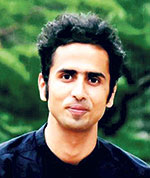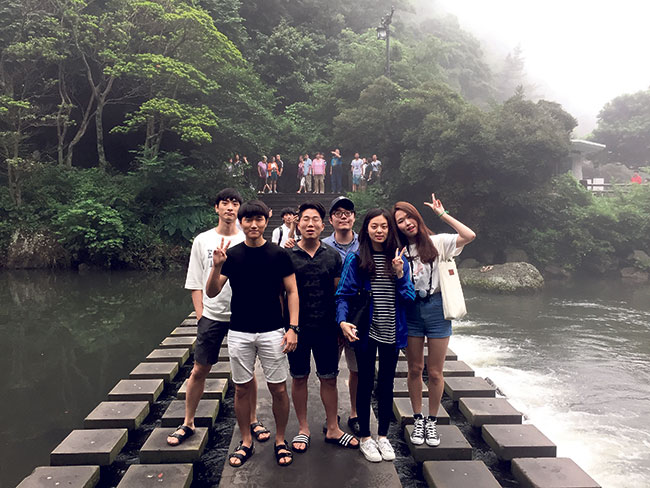If you had asked me where I wanted to study for my Masters a few years ago, I would have listed the universities from United States, Australia and Europe like the majority of Nepali students simply because of extra opportunities and post-academic factors. Yet, here I am in a university in South Korea.

Visiting another country is an experience, but studying abroad is life-changing. I landed into a country that is nothing like Nepal, boarded a bus to my apartment and found myself thinking, “How am I ever going to make it in Korea?” I was every bit curious about Korean cultures and lifestyles since the first day. And during the first month here, like an elementary student, I took some small steps in South Korea; learned to use chopsticks, use Kakao talk (popular instant messaging application), make new friends and go drinking together.
Being a Hindu, I have several food restrictions such as not eating pork and beef. This stands to be one of the main problems for Nepali students in Korea. And I still feel awkward when I have to share kimchi and other traditional Korean pickles in the middle of the table, especially when the other person is eating beef or pork. Because of my reservation on eating some kinds of meat and also because I come from country where one is not supposed to touch others’ food or eating utensils while eating, I have not been able to shake the feeling of uneasiness since the very beginning.
Many countries in East Asia, including the Korean peninsula, ban English in their elementary education to support development of their mother tongue.
In graduate level, except few universities, the classes are conducted in English, only if there are international students enrolled in the class, while the elaboration and other information are shared in their native language(s). When I arrived at the Kyonggi University, language barrier was the biggest and most common problem that many international students faced. And, I too had to face this problem. I remember seeing the Korean alphabets dancing in front of my eyes every time I tried to read. It was equally difficult to find the right bus while travelling and I had troubles bargaining, asking for discount while shopping too.
 I used to work for some start-up companies in Nepal. After coming here, I joined a research-based study, funded by Korean government project (ITRC). I remember, on my first day in the laboratory, my lab-mates had greeted me nicely and were asking about Nepal and Mount Everest. In fact, if you are a Nepali in Korea, one common question you will be asked every time is ‘Have you climbed Mount Everest?’ Hiking local mountains is a popular leisure activity in Korea and Korean believe they have sacred and religious significance. So, they think that it is common for Nepalis to climb Mount Everest.
I used to work for some start-up companies in Nepal. After coming here, I joined a research-based study, funded by Korean government project (ITRC). I remember, on my first day in the laboratory, my lab-mates had greeted me nicely and were asking about Nepal and Mount Everest. In fact, if you are a Nepali in Korea, one common question you will be asked every time is ‘Have you climbed Mount Everest?’ Hiking local mountains is a popular leisure activity in Korea and Korean believe they have sacred and religious significance. So, they think that it is common for Nepalis to climb Mount Everest.
In the lab, we study current railway problems in Korea and relate them to safety issue in railway system. I had come to do my Master’s in software engineering, but when I took railway safety as my research domain, it took me by surprise as well. It had never occurred to me that there was scope for railways in Nepal though. I think if anyone dreams so it would be like ‘waiting for a train in an airport’.
The laboratory is a 14-hour job and has its pressure while working. But during my days at laboratory, I have noticed changes in my personality and found that I enjoy my time in front of the computer, even if I’m alone and working late night shifts. Writing research paper, submitting to highly-reputed journals and the wait for approval has become a part of my daily schedule and has its own fun. I was stunned to find that Nepali scholars and their publications are highly considered in Korea. In fact, Dhiraj Kumar Chaudhary, another research scholar in Korea, once said ‘research scholars in Korea are the educated student labours from Nepal’.
If you are to compare your life in Nepal, everyone would feel very uncomfortable coming to a different country. I think Nepalis are comparatively more welcoming; whenever we meet a stranger in a bus, at least we greet them with a smile. But here, majority of people are busy on their smartphones either in subways or public buses, and they usually do not care who they are travelling with.
But the information and technology-based services including banking, telecommunication and transportation have added values to people’s lives. The services are very fast and reliable that you barely remember poor services that were in Nepal. Also, South Korea has relatively stronger arrangements when it comes to public safety and security enforcement. While exploring the cities, I could see girls walking freely at midnights, 24-hour convenient stores and late night bus services, which are unusual in developing countries.
THAPALIYA is currently doing his research in Railway Safety at Software Engineering Laboratory from Kyonggi University, South Korea.


Leave A Comment